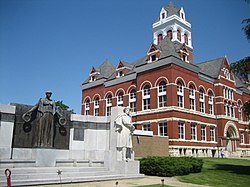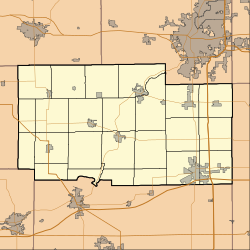Oregon, Illinois
| Oregon | |
|---|---|
| City | |

The Ogle County Courthouse at the heart of Oregon, Illinois
|
|
| Motto: Gem of the Rock River Valley | |
| Location within Ogle County | |
| Coordinates: 42°00′52.59″N 89°19′57.13″W / 42.0146083°N 89.3325361°WCoordinates: 42°00′52.59″N 89°19′57.13″W / 42.0146083°N 89.3325361°W | |
| Country | United States |
| State | Illinois |
| County | Ogle |
| Township | Oregon-Nashua |
| Founded | 1833 |
| Government | |
| • Mayor | Ken Williams (R) |
| Area | |
| • Total | 2.03 sq mi (5.3 km2) |
| • Land | 1.96 sq mi (5.1 km2) |
| • Water | 0.07 sq mi (0.2 km2) |
| Elevation | 709 ft (216 m) |
| Population (2010) | |
| • Total | 3,721 |
| • Density | 1,800/sq mi (710/km2) |
| Time zone | CST (UTC−6) |
| • Summer (DST) | CDT (UTC−5) |
| Postal code | 61061 |
| Area code(s) | 815 |
| Website | cityoforegon |
Oregon is a city in and the county seat of Ogle County, Illinois, United States. The population was 3,721 at the 2010 census.
The land Oregon, Illinois was founded on was previously held by the Potawatomi and Winnebago Indian tribes. In fact, later, settlers discovered that the area contained a large number of Indian mounds, most 10 to 12 feet in diameter.
Ogle County was a New England settlement. The original founders of Oregon and Rochelle consisted entirely of settlers from New England. These people were "Yankees", that is to say they were descended from the English Puritans who settled New England in the 1600s. They were part of a wave of New England farmers who headed west into what was then the wilds of the Northwest Territory during the early 1800s. Most of them arrived as a result of the completion of the Erie Canal. When they arrived in what is now Bureau County there was nothing but a virgin forest and wild prairie, the New Englanders laid out farms, constructed roads, erected government buildings and established post routes. They brought with them many of their Yankee New England values, such as a passion for education, establishing many schools as well as staunch support for abolitionism. They were mostly members of the Congregationalist Church though some were Episcopalian. Culturally Bureau County, like much of northern Illinois would be culturally very continuous with early New England culture, for most of its history.
...
Wikipedia


